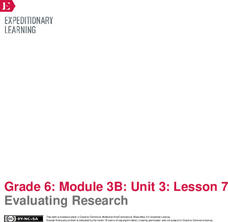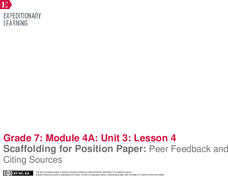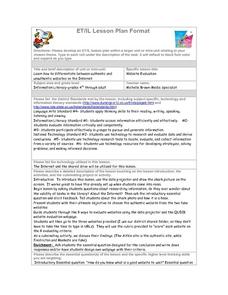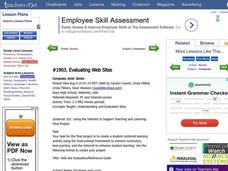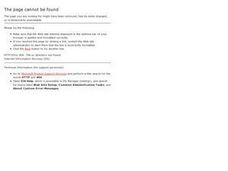Curated OER
Hamlet Research Paper: Find, Evaluate, and Select Appropriate Research Sources
Help young researchers find credible sources online. Modeling with a Google search for information about Shakespeare’s Macbeth, use a computer projector or Smart Board to show class members how weak the top three search results are....
Stanford University
Hurricane Katrina
The adage says that journalism is the first draft of history. How should people evaluate these sources of information? Taking into account various sources, including those from various perspectives and different creators, learners...
Curated OER
Using Primary Sources
Students examine primary source documents about slavery in the United States. They evaluate the documents for the evidence they provide, reliability and bias. They present their evaluation to the class.
National Endowment for the Humanities
The Gulf of Tonkin Resolution and Escalation of the Vietnam War
The Gulf of Tonkin Resolution propelled America's involvement into a bloody conflict—and it was based on a fallacy. Using the resolution and other documents from the Vietnam War, including declassified documents, young historians...
National WWII Museum
Women and the War: Supporting Historical Interpretations
Rosie the Riveter may be an iconic image from World War II, but not all historians agree on how the conflict affected women in the workplace. Individuals evaluate the writings of well-known historians on the topic, and then decide: Was...
National Endowment for the Humanities
Using Historic Digital Newspapers for National History Day
Your learners will take a trip through history as they peruse through historic digitalized newspapers, reading real articles from such historical periods in the United States as the Temperance movement and passage of the Thirteenth...
American Battlefield Trust
The Battle of Saltville
It may be hard to see through the fog of war, but primary sources describing what happened at the Battle of Saltville during the Civil War shed some light on what happened there. Using primary sources, including descriptions from...
American Battlefield Trust
Joshua Chamberlain Lesson Plan
While Joshua Chamberlain's name is not as iconic as Abraham Lincoln or Robert E. Lee, he still played a pivotal role in the military engagements of the Civil War. Using two secondary sources—including one that draws heavily from his...
National WWII Museum
The War in Europe: Evaluating Historic Decisions
War brings a whole new set of ethical dilemmas. From deciding whether to enlist in a segregated and racist Army to whether to sacrifice civilian lives to prepare for a critical D-Day invasion, leaders during World War II faced many...
EngageNY
Evaluating Research
Calling all archaeologists! Scholars dig through their research about overfishing, searching for the best information to include in their consumer guides. Next, pupils engage in a pair-share activity to discuss their findings with a...
EngageNY
Gathering Information about Screen Time: Assessing and Reading Internet Sources, Day 2
Calling all researchers! Using the resource, scholars continue conducting independent Internet research about a chosen research question. As they browse the web in search of articles to answer their questions, pupils paraphrase their...
EngageNY
Scaffolding for Position Paper: Peer Feedback and Citing Sources
Scholars partner up for peer feedback of their position papers. After reviewing peer feedback guidelines, pairs take turns presenting their papers and completing a Peer Feedback Form. The class then has a mini lesson on MLA format.
Center for History Education
Debating Social Security: Understanding and Evaluating the Social Security Act of 1935
With throngs of Americans out of work and hungry, Franklin D. Roosevelt made the bold move to establish a social safety net with programs such as Social Security. The move was—and still is—controversial. Using documents from the 1930s,...
PwC Financial Literacy
Evaluating Financial Information
Advertising is all around us. Sometimes those advertisements are directed at young people, so it's important for youngsters to recognize false advertising and fraud when they see it. That's what this instructional activity is all about....
iCivics
NewsFeed Defenders Extension Pack
Accuracy, transparency, trustworthiness, and impartiality are four unspoken rules of journalism. Scholars delve deep into the subject by discussing the pros and cons of relying on social media for news. They also play an online game to...
Curated OER
Website Evaluation
Students examine how to differentiate between authentic and unauthentic websites on the Internet. They view and discuss a photo of a shark that is a hoax, then discuss the eight ways to evaluate websites. Students then evaluate three...
Curated OER
Evaluating Web Sites
Students examine how to evaluate a website. They discuss a graphic organizer, conduct Internet research, and apply a checklist of criteria to various websites.
Curated OER
William Apess and the Mashpee "Revolt" of 1833
Prompt your class with the following question: What was the status of American Indians in Massachusetts during Jackson's presidency? To answer this question, class members will read a series of primary source documents (attached),...
Curated OER
Note-Taking: K.I.S.S. "Keep It Short and Simple"
Note-taking is an essential study skill, and it needs to be taught! In the context of a research project on energy sources, learners find multiple sources, evaluating, paraphrasing, and citing them correctly. Two lists with note-taking...
Curated OER
The Federalist Defense of Diversity: Extending the Sphere
How did early Americans ensure expansion while also securing the rights of citizens? Alexander Hamilton and James Madison, two of our early leaders, considered the problem of faction to be the "mortal disease" that created unstable...
Curated OER
Lesson 8: Prithee, Pause!
High school learners examine primary source materials on history and the supernatural which relate to Julius Caesar. They then act out a scene based on different historical understandings and identify facts, theories, and similarities in...
Curated OER
Whose History Is It Anyway? Patterns in History
Read and examine primary source material in order to analyze, synthesize, and debate information about the Great Depression. Critical analysts research various source materials related to the Great Depression. They work in teams to...
Curated OER
The New England Fishing Industry:Sea Changes in a Community
Explore New England's economic and cultural past and possible issues New Englanders will face in the future. Middle and high schoolers research the fishing industry and the need for regulation. They analyze the topography of New England...
Curated OER
Liberty Rhetoric
What is liberty rhetoric? Examine how people have used it in four different time periods and situations. High schoolers investigate original source documents and compare them with the Declaration of Independence to decide how liberty...











